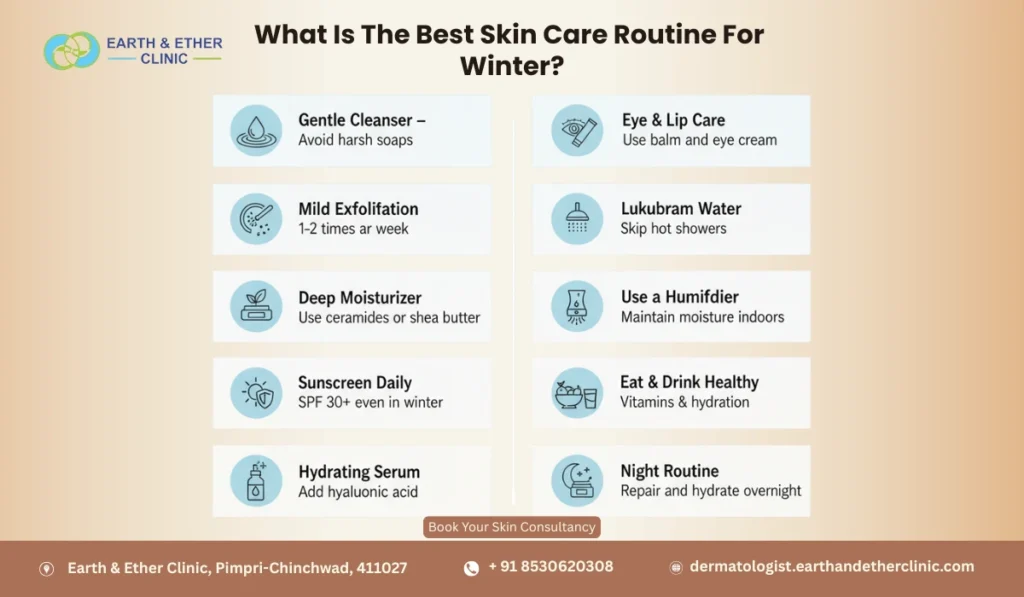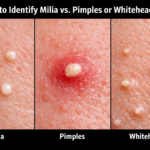Winter is the season of cozy sweaters, hot drinks, and cool breezes—but it’s also the time when your skin faces some of its toughest challenges. The drop in humidity, exposure to indoor heating, and harsh winds can strip away your skin’s natural moisture barrier, leaving it dry, flaky, and irritated.
According to Best dermatologists, maintaining a customized skin care routine during winter is crucial to keep your skin nourished, hydrated, and healthy. Whether you have dry, oily, combination, or sensitive skin, winter skincare needs a few thoughtful adjustments to prevent seasonal damage.
Understanding How Winter Affects Your Skin
When temperatures fall, so does the humidity in the air. This lack of moisture directly impacts your skin in several ways:
- Loss of Natural Oils: Cold air and hot showers can strip away essential lipids from your skin, making it feel tight and dry.
- Weakened Skin Barrier: Low hydration levels weaken the protective layer of the skin, allowing irritants to penetrate easily.
- Increased Sensitivity: People often experience redness, itching, or flaking during winter due to the compromised barrier.
- Slower Cell Renewal: Reduced blood circulation and hydration slow down skin regeneration, leading to dullness.
That’s why adjusting your skincare steps to the season is essential.
winter skin care routine step-by-step
Let’s explore an effective, dermatologist-approved winter skincare routine that helps keep your skin soft, supple, and glowing even in the coldest months.
1. Switch to a Gentle, Hydrating Cleanser
Cleansing is essential, but harsh cleansers can worsen dryness in winter. Choose a mild, sulfate-free cleanser that removes impurities without stripping natural oils.
- For dry skin: Use a creamy or oil-based cleanser with ingredients like ceramides or glycerin.
- For oily or acne-prone skin: Opt for a low-foam, pH-balanced cleanser with niacinamide or hyaluronic acid.
Tip: Avoid over-washing your face. Twice a day is enough to maintain moisture balance.
2. Exfoliate Mindfully
Exfoliation helps remove dead cells and improves absorption of skincare products, but excessive exfoliation in winter can damage your skin barrier.
- Use a mild chemical exfoliant (like lactic acid or PHA) once or twice a week.
- Avoid physical scrubs that contain harsh granules.
- Follow up with a hydrating moisturizer immediately after exfoliating.
This step ensures your skin remains smooth without feeling tight or irritated.
3. Prioritize Deep Moisturization
Moisturizing is the heart of winter skincare. The key is to lock in hydration and strengthen the skin barrier.
- Choose moisturizers rich in ceramides, shea butter, squalane, or hyaluronic acid.
- Apply your moisturizer on slightly damp skin to trap moisture.
- If your skin feels extremely dry, layer a facial oil over your moisturizer at night.
- Embryolisse Lait-Creme Concentre,
- Cetaphil Moisturising Lotion For Dry To Normal Sensitive Skin – Dermatologist Recommended,
- Ponds Super Light Gel Oil Free Moisturiser With Hyaluronic Acid + Vitamin E.
Pro Tip: Apply a thicker moisturizer before bed to help your skin recover overnight.
4. Don’t Skip Sunscreen (Even in Winter)
Many people assume sunscreen isn’t necessary during winter because of the cooler weather. However, UV rays penetrate clouds and can still damage your skin.
- Use a broad-spectrum sunscreen (SPF 30 or higher) daily, even on cloudy days.
- Reapply every 3–4 hours if you’re outdoors.
- Look for sunscreens with added moisturizers to prevent dryness.
Remember — consistent sun protection is the most effective way to prevent premature aging and pigmentation.
5. Add a Hydrating Serum
Hydration serums are game-changers in winter skincare. They penetrate deeper layers of the skin and boost moisture retention.
Look for serums containing:
- Hyaluronic acid: Attracts and holds water in the skin.
- Niacinamide: Improves barrier function and soothes redness.
- Panthenol or peptides: Help repair and plump the skin.
Use the serum right after cleansing and before moisturizing for maximum benefit.
6. Nourish Your Lips and Under-Eye Area
Lips and under-eye skin are thinner and lose moisture quickly during winter.
- Apply a lip balm containing beeswax, shea butter, or lanolin.
- Use an eye cream with hyaluronic acid or vitamin E to prevent fine lines and puffiness.
Avoid licking your lips — it worsens dryness and cracking.
7. Choose Lukewarm Water Over Hot
Hot showers might feel comforting during winter, but they deplete your skin’s natural oils. Instead:
- Use lukewarm water for washing your face and bathing.
- Limit your bath time to 10–15 minutes.
- Apply moisturizer immediately after patting your skin dry.
This small change helps maintain your skin’s hydration levels significantly.
8. Use a Humidifier Indoors
Indoor heating systems reduce air moisture, causing dry skin and chapped lips. Running a humidifier in your bedroom can maintain humidity levels and prevent your skin from drying out overnight.
If a humidifier isn’t available, placing a bowl of water near the radiator can help restore moisture in the air.
9. Drink Enough Water and Eat Skin-Friendly Foods
Hydration isn’t just topical. Drinking enough water and eating nutrient-rich foods helps your skin stay healthy from within.
Include foods high in:
- Omega-3 fatty acids: (salmon, flaxseeds, walnuts) for skin barrier health
- Vitamin C: (oranges, kiwi, bell peppers) to boost collagen production
- Vitamin E & Zinc: (nuts, seeds, spinach) for skin repair and protection
Avoid excessive caffeine and alcohol, as they can dehydrate your skin.
10. Adjust Your Night Routine
Nighttime is when your skin regenerates. A winter-specific night routine should focus on repair and deep nourishment:
- Cleanse gently.
- Apply a hydrating serum or essence.
- Seal with a thick moisturizer or sleeping mask.
This helps your skin recover from daytime stressors like cold air and pollution.
Winter Skin Care for Different Skin Types
Every skin type has unique needs in winter. Here’s how you can modify your routine:
Dry Skin:
- Use richer creams with ceramides or shea butter.
- Avoid alcohol-based toners.
- Consider adding facial oils at night.
Oily Skin:
- Choose gel-based moisturizers with hyaluronic acid.
- Don’t skip sunscreen.
- Avoid over-cleansing, which triggers more oil production.
Combination Skin:
- Use a lightweight moisturizer in the T-zone and a thicker one on dry areas.
- Balance exfoliation — once a week is enough.
Sensitive Skin:
- Stick to fragrance-free, hypoallergenic products.
- Avoid strong acids or retinoids unless prescribed by a dermatologist.
Common Winter Skin Concerns and How to Treat Them
- Flaky Skin:
Exfoliate gently and apply occlusive moisturizers. - Cracked Heels or Hands:
Use thick, petroleum-based creams before bedtime and wear cotton socks/gloves overnight. - Itchy Skin (Winter Itch):
Avoid hot water, and use fragrance-free, ceramide-rich body lotions. - Redness or Rosacea Flares:
Protect skin from cold winds and avoid alcohol-based skincare products.
If your symptoms persist, it’s best to seek advice from a dermatologist in Pune to identify underlying causes and get tailored treatments.
When to See a Dermatologist
If winter dryness leads to persistent itching, eczema, or cracking that doesn’t improve with over-the-counter products, consulting a specialist is important. A skin specialist in Hinjewadi can assess your skin condition and recommend medical-grade moisturizers, barrier creams, or professional treatments such as hydrafacials, chemical peels, or laser therapy to restore your skin’s health.
Professional Winter Skin Treatments to Consider
- Hydrafacial or Aqua Therapy: Deeply cleanses and hydrates dry skin.
- Chemical Peels: Helps remove dull, dead cells and improve glow.
- Laser Rejuvenation: Enhances skin texture and brightness.
- Microneedling or PRP: Stimulates collagen production for smoother, younger-looking skin.
A consultation with the best skin doctor in Pimpri Chinchwad can help determine which treatments are best suited to your skin’s needs this season.
Conclusion
Winter may challenge your skin, but with the right care and consistency, you can maintain a soft, glowing complexion throughout the season. Remember, skincare is not about using more products—it’s about using the right ones, at the right time.
Stay hydrated, protect your skin barrier, and consult a qualified dermatologist for personalized guidance if your skin concerns persist.
Your skin deserves expert care this winter—treat it with the love and attention it needs.
Read Here: Dr. Varsha Rangari – Experienced Lady Skin Specialist in Pimpri Chinchwad





